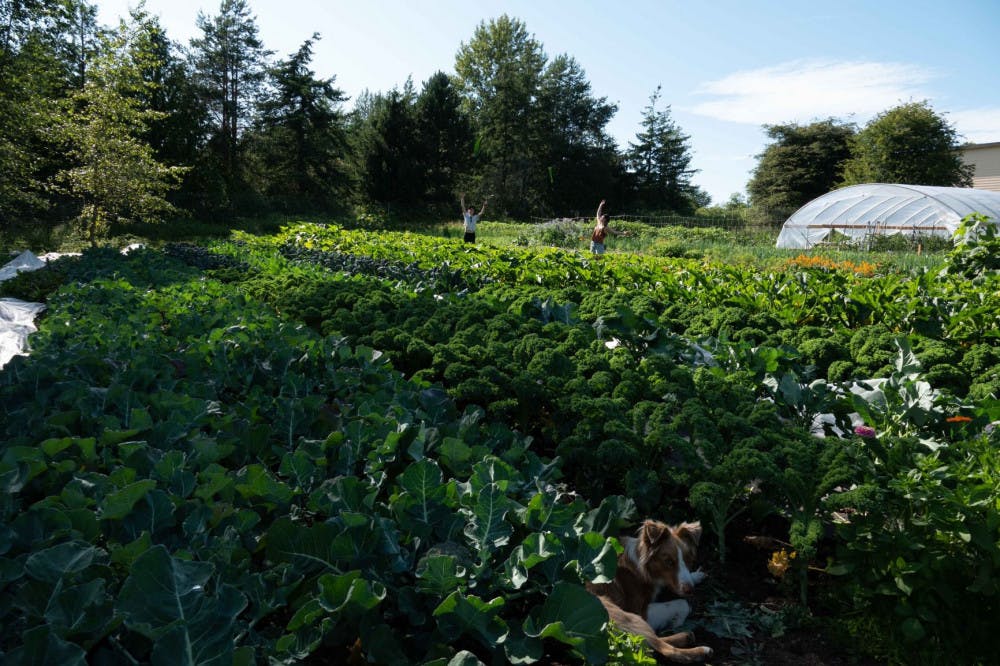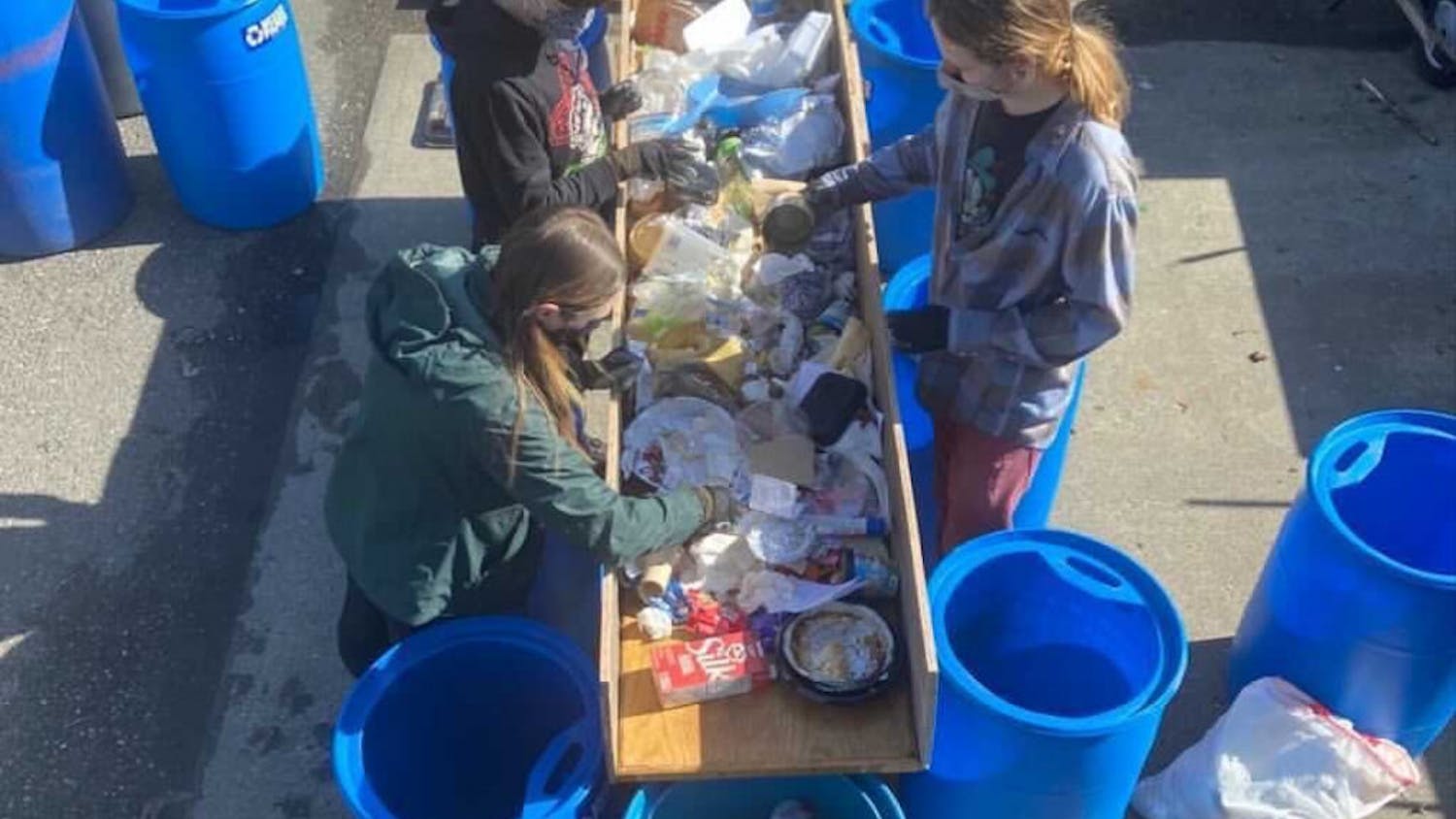
While driving through Bellingham’s Birchwood neighborhood, it’s hard to miss the small, colorful boxes that occupy street corners and the front yards of homes. Food share boxes, which are often filled with pasta, canned food, bread, fresh vegetables and various other pantry items, are providing necessary staples to a community in need.
The boxes are part of the Birchwood Food Desert Fighters’ community-driven approach to fighting food inaccessibility in the neighborhood.
Tina Mckim, a member of the Food Desert Fighters’ steering committee, said the boxes provide people in Birchwood a free way to access healthy and fresh food. There are currently 10 of them scattered around the neighborhood.
“Our motto is, share what you have, take what you’d like,” McKim said.
Birchwood has been designated a food desert by the U.S. Department of Agriculture since 2016 when the Albertson’s grocery store located in the Park Manor shopping complex was shut down.
According to the USDA, an area qualifies as a food desert if enough people within an area meet criteria to be considered low-income, and if one-third of the population has to travel more than a mile to access fresh groceries at a supermarket.
Due to a non-compete clause written by Albertsons in 1982, new grocery stores are prohibited from opening on the former Albertsons site, which the company still owns, until 2042. The neighborhood has now existed as a food desert for almost five years.
The restricted accessibility to a new grocery store led to the creation of the Birchwood Food Desert Fighters in 2017. The group consists of both Birchwood residents as well as allies from surrounding areas, like McKim.
McKim said that now, in the midst of the pandemic, food insecurity is affecting more people than ever. She added that the greater need for accessible food inspires the Food Desert Fighters to work towards stronger food sovereignty in the Birchwood area.
Ali Loker is a student in the University of Nebraska Lincoln’s Doctor of Plant Health Program and co-author of “Urban Food Sovereignty: Urgent Need for Agroecology and Systems Thinking in a Post-COVID-19 Future.” Loker described food sovereignty as a broad concept that emphasizes people’s right to food and their active participation in food systems.
Loker said the size and interdependency of the American food system has caused barriers to food access across the country, and that those difficulties have been increased by the pandemic. Loker added that the few large corporations that control the American food supply chain are only interested in consumer’s transactional participation in the system.
“They have a large interest in maintaining the status quo, which is not food sovereignty,” Loker said.
Loker said local, community food systems have been a strong solution to food shortages at large chain supermarkets during the past year.
“From a local perspective, there is more opportunity to be more adaptable and resilient to these changes that we can’t predict,” Loker said.
Since the closing of the Albertsons, the Food Desert Fighters have been working to create a network of community gardens to grow fresh food to distribute to community members. Community resilience in times of crisis is something McKim and the Food Desert Fighters hope to achieve through their work.
“If there’s another pandemic, or if the pandemic gets worse and there are shortages in the stores, we are still able to grow and process and save food in the neighborhood ourselves, to sustain ourselves,” McKim said.
McKim said the success of community gardens has been achieved not only through working with neighbors but also through collaborating with organizations like The Arc of Whatcom County, an advocacy group that provides outreach and resources to people with developmental and intellectual disabilities.
McKim said collaborating with members of The Arc is an important way to combat the isolation that many disabled people face in everyday life. The work between the two groups is what McKim called a “solidarity, not charity” model.
“We grow together, and everyone is welcome to harvest what they would like,” McKim said. “Anything that isn’t taken by people each week is taken to the weekly community food and supply share.”
The Food Desert Fighters’ weekly Saturday food shares are opportunities for Birchwood residents to collect food from neighborhood gardens, local farms and organizations that have leftover produce and food. McKim said that through the weekly food shares, they have been able to give away roughly 1,000 to 2,500 pounds of food a week.
“Anybody is welcome,” McKim said. “You don't have to prove you live anywhere. You don't have to show any paperwork, you just show up and you can take what you would like, and there aren't limits to how much people can take.”
In addition to small-scale community garden projects, residents have also been able to access fresh food from City Sprouts. The one-acre urban farm, located in Birchwood, has been providing fresh vegetables to the neighborhood since 2018.
Ellie Duncan, co-owner of City Sprouts with business partner Annah Young, said that before moving to Bellingham in 2018, they didn’t know Birchwood was a food desert. After arriving in the neighborhood, they quickly learned about the issues surrounding food access.
“We felt very strongly that we wanted the food that we were growing to stay in the neighborhood and stay as accessible as possible while still running a viable business,” Duncan said. “It would feel strange to us to have a production farm and just be sending all of the produce away from a place that could really use it.”
The state of food insecurity determined what type of crops Duncan and Young wanted to grow at City Sprouts. Duncan said many urban farms have been able to make a significant profit by growing high-value crops that can be sold to restaurants or farmers markets, but that these businesses aren’t necessarily reaching the immediate community.
“You’re growing baby lettuces and salad greens and sprouts and all these things that are high value but low calorie, and you are selling them typically to restaurants or farmers markets,” Duncan said. “I love that, that’s amazing. But we really wanted to focus on calories, because we’re here in this designated food desert. We wanted to keep the produce here, and have a diversified veggie farm.”
Currently, City Sprouts grows more than 100 vegetable varieties in a given year.

City Sprouts is able to sell its crops to residents through its Community Supported Agriculture program. The program has a sliding scale payment model that allows participants to pay what they can to receive boxes of fresh produce every week. The farm accepts EBT/SNAP benefits, and also allows CSA members to participate in a “contributing neighbor share” that compensates for the lower cost options on the scale.
Duncan said there are currently about 60 people who subscribe to the program.
“We wanted to make it as accessible as we could, and heard about a sliding scale model and it's worked out amazingly well,” Duncan said.
Duncan said that City Sprouts’ CSA participants are relatively evenly spread across the sliding scale, which has meant the farm has been able to maintain a viable business model and profit from their crops while still providing for the community.
McKim said that in addition to their accessible CSA program, City Sprouts shares leftover produce with the Food Desert Fighters and provides plant starts for neighbors who want to form their own gardens.
City Sprouts also started the Birchwood Farmers’ Market in 2018. Duncan said the cooperative farm stand located at the site of the old Albertsons brings together a variety of fresh food and goods sourced from five to 15 farms in the area.
McKim said the neighborhood farmer’s market has been fantastic. Moving forward, McKim said she hopes more people from all over Bellingham are able to help and be helped by their neighbors when it comes to accessing healthy food and produce.
“If you have the capacity to grow food, grow extra for your neighbors,” McKim said. “Consider putting out a little food box, it doesn’t have to be anything fancy. Talk to some of your neighbors and see if they’ll put one out. There’s more need than ever with this pandemic, and we’re not done.”





